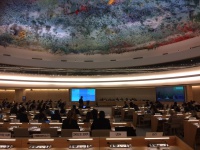Home » Press Releases » SYR - News » Syria: UN Member States Propose 231 Recommendations During Universal Periodic Review
The practice of torture, arbitrary detentions and enforced disappearances
Despite being a party to the Convention against Torture and Other Cruel, Inhuman or Degrading Treatment or Punishment (UNCAT), torture in Syria is yet to be eradicated. In fact, in October 2012, the Committee against Torture (CAT) concluded that torture was a systematic practice in all centres controlled by the government and its allied forces. During the pre-session briefing of State delegations on 7 October, Alkarama called on UN Members States to recommend Syria to put an end to the widespread practice of torture and guarantee the right to life of all detainees in accordance with international humanitarian law, recommendations that were made by over 10 States including France, Norway, Canada, Germany and Spain.
Several Member States, including France, UK, US, Slovenia and Germany, expressed concern about the practice of arbitrary detention and recommended Syria to "release immediately all persons unjustifiably detained".
Moreover, since the beginning of the conflict, enforced disappearances have become a widespread and systematic practice and constitute, without any doubt, within the meaning of the Rome Statute, a crime against humanity. Alkarama called on UN Member States to recommend Syria to bring this practice to an end, to clarify all cases of enforced disappearances and inform the victims' families about the fate of their missing relatives. During the review, several States including Luxembourg, Spain, Austria and Brazil, therefore made recommendations that echoed Alkarama's concerns.
Attacks against civilians and hospitals
For the entire duration of the conflict, governmental forces have conducted indiscriminate attacks in densely populated areas causing the death of thousands of civilians. In several attacks, the authorities have made use of barrel bombs, cluster munitions, as well as weapons whose effects are of an indiscriminate nature and hence are prohibited by international humanitarian law as well as by the UN Security Council Resolution 2139 (2014). In addition, the use of chemical weapons has been documented, despite Syria being party to the Convention on the Prohibition of Chemical Weapons since October 2013. Furthermore, hospitals and health facilities are systematically the object of direct attacks by governmental forces and humanitarian access has continuously been impeded.
In view of these facts, more than 50 States, including France, Switzerland, UK, Sweden, Germany, Ireland, Chile and Pakistan recommended Syria to "take immediate measures to cease indiscriminate attacks against civilians, hospitals, their personnel and humanitarian convoys" and "to ensure full and unhindered humanitarian access including in all besieged areas".
Cooperation with the UN and the Independent International Commission of Inquiry
A large majority of States including Mexico, Australia, Switzerland, Germany, France, Macedonia, Czechia and Japan recommended Syria to cooperate with the mechanisms of the UN, in particular the UN Special Envoy, to alleviate the effects of the crisis on citizens and to grant full and unimpeded access to the Independent International Commission of Inquiry.
Furthermore, numerous Member States including Sudan, Algeria, China, Nicaragua and Iceland, have encouraged Syria to "redouble its efforts towards reaching a political settlement to the crises in Syria through comprehensive with all parties."
What is next?
Overall, Syria received 231 recommendations from UN member States, which the country must consider before March 2017 and inform the Human Rights Council of whether these are accepted or rejected. The State should then implement the accepted recommendations until its third UPR cycle in 2021, in order to improve the human rights situation on the ground.
For more information or an interview, please contact the media team at This email address is being protected from spambots. You need JavaScript enabled to view it. (Dir: +41 22 734 1008).
 Algeria
Algeria Bahrain
Bahrain Djibouti
Djibouti Egypt
Egypt Iraq
Iraq Palestine/Israel
Palestine/Israel Jordan
Jordan Kuwait
Kuwait Lebanon
Lebanon Libya
Libya Mauritania
Mauritania Morocco
Morocco Oman
Oman Qatar
Qatar Saudi Arabia
Saudi Arabia Sudan
Sudan Syria
Syria Tunisia
Tunisia United Arab Emirates
United Arab Emirates Yemen
Yemen Other Countries
Other Countries







